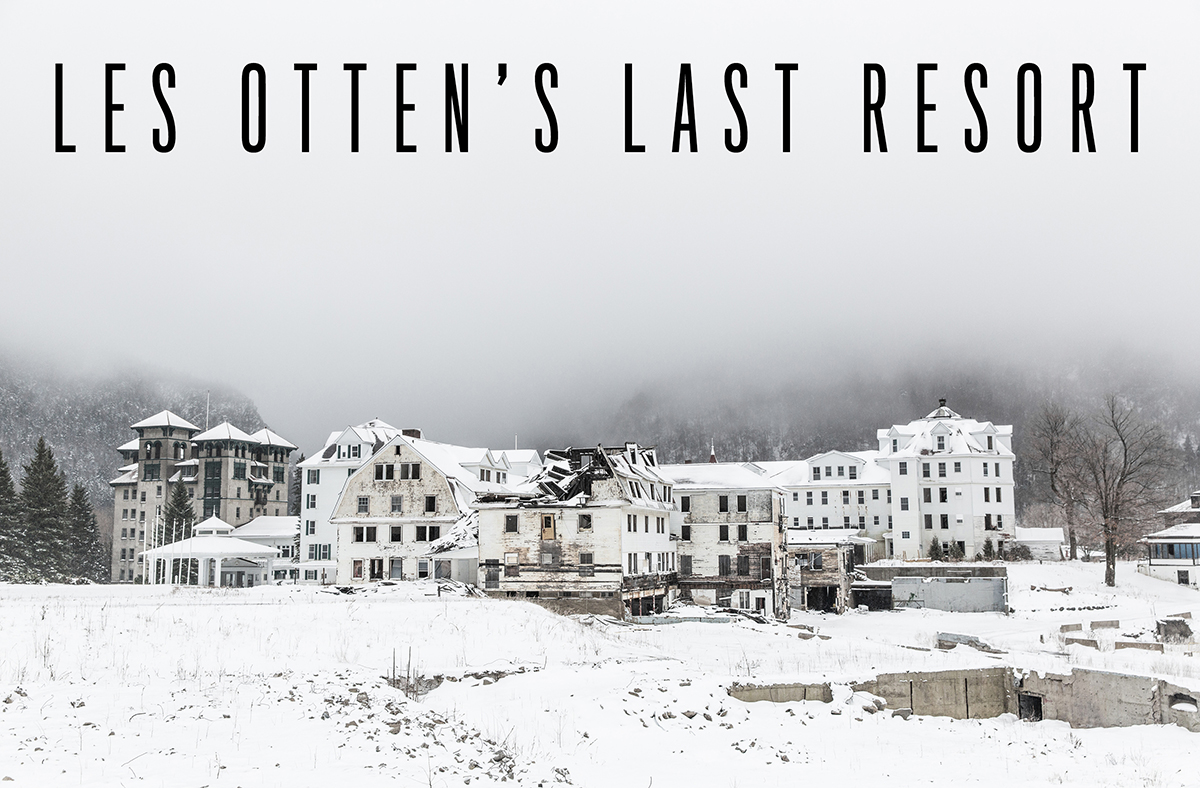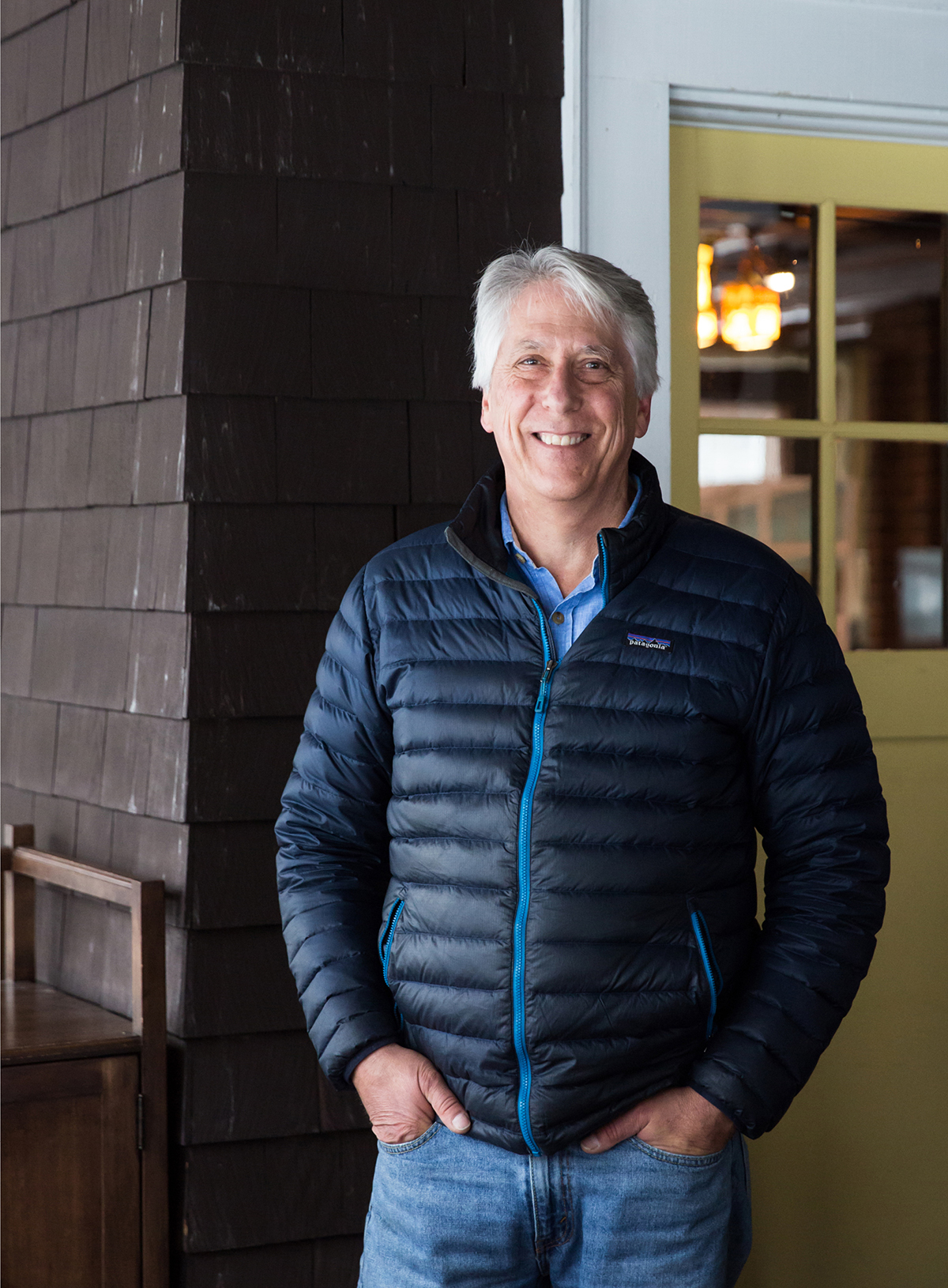Les Otten’s Last Resort

The crumbling Balsams ski resort in New Hampshire’s North Country is Les Otten’s latest project. / Photograph by Greta Rybus
Like many dreamers, Les Otten has a tendency to see opportunity where others see nothing but ruin. The first time I met him, this past fall, we were in northern New Hampshire on the decaying grounds of the Balsams Resort, which Otten intends to resurrect. Tall and athletic, with a head of white hair, the 67-year-old was wearing the same thing he wears almost every day: head-to-toe denim and sneakers. Trailed by his golden retriever, he talked fast, in a way that suggested he was thinking out loud. In the first few minutes, he introduced both himself and his dog, Sophie, twice.
From the time it opened, in 1866, until it went belly up, in 2011, the Balsams was one of New England’s grandest hotels, drawing aristocrats and celebrities from New York, Boston, and even Europe. Guests arrived by stagecoach at first and, later, by motorcar to escape city pollution and enjoy the salubrious effects of mountain air. Babe Ruth and Frank Sinatra were among the many visitors. During Prohibition, the Balsams’ golf clubhouse doubled as a bordello and a gambling den. On this day, though, the crumbling property felt more like a living time capsule—and looked like the site of a bomb blast.
Although parts of the towering hotel appeared to be in solid shape, the rear of the building was destroyed. There was a gaping hole in the roof, the clapboard walls were charred and rotting, and a tangle of wood scraps and rusted metal covered the ground. Outside was a football field–size hole filled with rubble. It seemed clear to me we were looking at a trash heap. Otten, however, stood with his hands on his hips and surveyed the chaos. When it comes to mountain resorts, he pronounced, this “may be the last, best opportunity in the United States.”
Otten’s ambitions are not small. In addition to restoring the Balsams to its former glory, he also intends to build—right next to it—a behemoth of a ski mountain that could eclipse Vermont’s Killington as the largest in the East. Plans also call for restoring a historical golf course designed by the legendary Donald Ross. The Balsams currently sits on 11,000 acres of mostly untouched land, including three lakes and 60 miles of trails. When—if—it’s completed, the new Balsams will also have a spa with outdoor hot baths, a vast market selling local goods, a culinary institute, a refurbished antique movie theater, and a modern revival of the Balsams’ famed white-glove dining service. It’s estimated the project will cost at least $159 million, coming largely from private investors and banks. Otten, for his part, is betting at least $5 million of his own money on the development. The state of New Hampshire is all in as well, poised to guarantee a $28 million loan to jump-start the project. All of this comes, of course, at a time when the East Coast ski industry is struggling to survive in the face of last winter’s paltry snowfall and, in the long run, the graying of the baby boomers.
As an aging recluse who lives in a lakeside log cabin of his own design in a tiny Maine town most people have never heard of, Otten seems like an unlikely candidate to take on one of the most ambitious economic development projects in New England. He wears either jeans or snow pants nearly 365 days a year. He’s a doting father of three and is given to nattering on, at length, to Sophie. Yet there is another side to Otten that makes him far more qualified to summit this latest challenge.
Otten made his name decades ago as the founder and CEO of American Skiing Company, a ski resort empire once worth $600 million and included Killington, Maine’s Sunday River, and Canyons in Park City, Utah. Throughout his 40-plus-year career, Otten earned a reputation as a brash, hard-charging leader who fearlessly battled his competitors in the press and made himself the face of his brand, putting his picture on his company’s brochures. Otten also worked with billionaire John Henry to buy the Red Sox, saving Fenway Park from demolition at a time when most people, including then-Mayor Tom Menino, believed it had outlived its usefulness. Not all of his ventures, though, have ended in success.
Following his rise in the ski industry, Otten crashed. He grew American Skiing too quickly, lost battles against nature (winters continued to get warmer) and the banks (they stopped lending him money), and had to resign from the company he’d created. American Skiing’s stock price eventually plummeted from $18 a share to zero.
Now, with the Balsams, Otten has his work cut out for him. He’s willing to assume the risk again because he believes the property can be the Platonic ideal of a mountain retreat. Even if he gets it fixed up, though, he’ll still need to convince people to come—not an easy sell considering the Balsams is in the northern New Hampshire wilderness, in one of the most economically depressed parts of the state. In what may be his wildest gamble yet, Otten is out to see whether he can remake his fortune and help revive the region’s ski industry, or if he’s destined for another wipeout.

Les Otten is hoping to bring a touch of luxury to the New Hampshire wilderness. / Photograph by Greta Rybus
It wasn’t long after earning a degree in business administration from Ithaca College in 1971 that Otten decided to hit the slopes. He joined Killington’s management training program after graduation, and within two years—at the age of 23—began running the day-to-day operations at Sunday River, owned by Killington’s parent company, the Sherburne Corporation. Some of his favorite stories are from the early, hardscrabble days when he and his small team did everything from pouring concrete floors to climbing the mountain to turn on snowmaking machines by hand.
At the time, Sunday River was the neglected little brother to Maine’s other nearby ski mountain, Sugarloaf, and received little attention or financial backing. Otten, though, saw its potential. Although the mountain was tiny, other peaks ripe for development and expansion surrounded it. He’d run the mountain on a shoestring for several years, but now wanted full control. Armed with a hefty loan, Otten bought Sunday River in 1980 and set out to realize his expansive vision.
Risk-taking was in Otten’s blood. His father, Albert Otten, was born in 1886 (he was 63 when Les was born), and had been a self-made Jewish steel magnate in Germany. Jailed and intimidated by the Nazis in the 1930s, he fled—leaving almost all of his fortune behind. After a journey through Switzerland, Holland, Mexico, and Canada, he settled down in New Jersey and started all over again with a new steel business. While he never realized the same wealth and stature he’d had in Germany, Albert was an undeniable success in his adopted homeland. Otten still speaks of his father, who died in 1985, with awe. “I’m one of those kids,” he says, “who will always live in the shadow of my father’s accomplishments.”
Otten also inherited his father’s talent for building a business from the ground up. When Otten started running Sunday River in the 1970s, it was a molehill with a single chairlift and three measly T-bars. But he reinvested profits aggressively, built new chairlifts nearly every season, and carried out a marketing blitz that helped drive revenue and distance him from his competitors. Among his always-provocative publicity stunts, Otten and his team mocked the snow conditions and travel times of other resorts, dumped truckloads of snow on Boston Common to remind city dwellers to go skiing, and, at least once, hired a plane pulling a Sunday River ad to fly over Killington. At the same time, he built affordable condos to draw additional skiers to the mountain.


